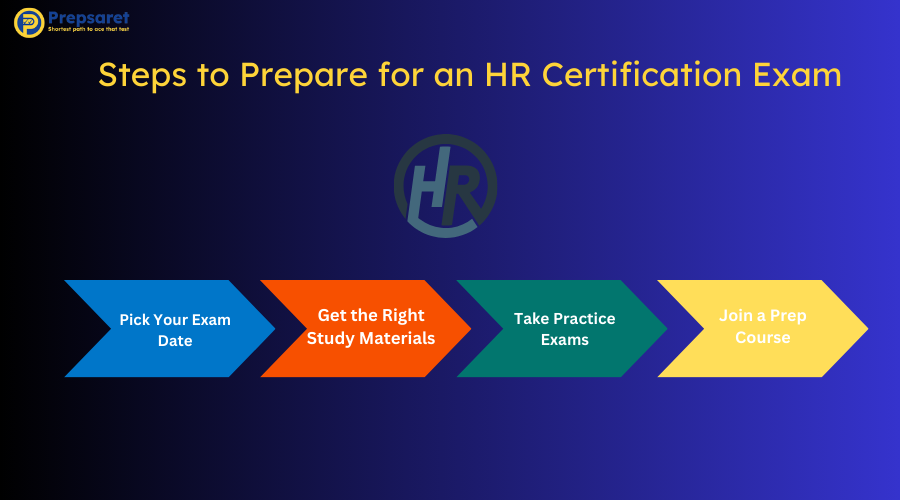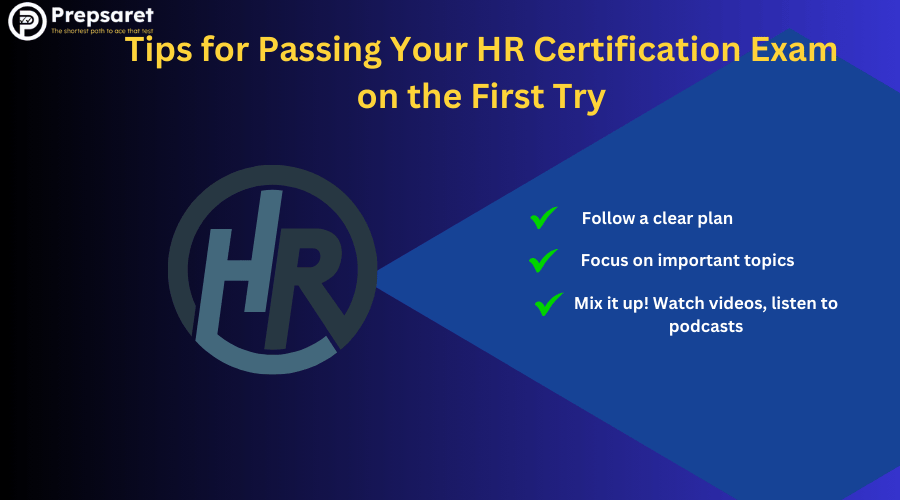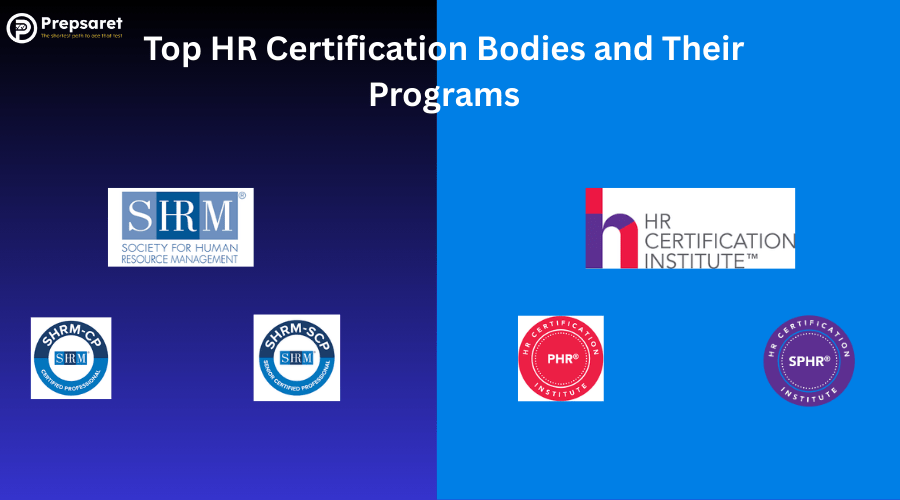How to Get HR Certification
Ready to level up your HR career? Let’s talk about how to get HR certified the easy (and fun) way.
If you’re thinking about a career in human resources—or already working in HR—you’ve probably heard about HR certification.
It’s a shiny, powerful badge that tells the world, “Hey, I know my stuff!” But how do you get one? Is it hard? Do you need years of experience? (Spoiler: Not always!)
In this guide, we’re going to break it all down. Step by step. No fluff. We’ll talk about what HR certification is, which one might be right for you, how Prepsaret study materials can help you prepare effectively, and how to actually pass that exam like a pro.
Whether you’re brand new to HR or a seasoned HR boss, this article will help you figure out your next move.
What Is HR Certification and Why It Matters
HR certification is a professional credential that proves you’ve got real-deal knowledge in human resources. Think of it like a driver’s license for your HR brain—it shows you know the rules, tools, and best practices of the job.
It’s also a sign of commitment. Employers love seeing certified HR pros. It tells them you take your role seriously and are always learning.
Here’s why it matters:
- Shows your expertise to employers and coworkers
- Boosts your resume and helps you stand out
- Opens doors to new jobs and promotions
- Increases your earning potential
- Gives you confidence in your HR knowledge
Whether you’re applying for your first HR job or aiming for a leadership role, getting certified can seriously speed up your career path.
Read on: HR Certification Courses
Types of HR Certifications: Which One Is Right for You?
There are a few big names in the HR certification world. The most popular certifying bodies are:
- SHRM (Society for Human Resource Management)
- HRCI (Human Resource Certification Institute)
- Others include ATD, WorldatWork, and some global certifiers
Each organization offers different types of certifications based on your experience level and goals. Here’s a quick breakdown:
- aPHR (Associate Professional in HR) – Great for beginners, no experience required
- PHR (Professional in HR) – For mid-level HR folks
- SPHR (Senior Professional in HR) – For strategic, senior-level leaders
- SHRM-CP (Certified Professional) – For mid-level HR generalists
- SHRM-SCP (Senior Certified Professional) – For experienced HR leaders
Continue reading: HR Certification Courses
Entry-Level vs Professional-Level HR Certifications
Let’s break it down even more:
Entry-Level: aPHR
- No HR experience required
- Perfect if you’re just starting or switching to HR
Mid-Level: PHR and SHRM-CP
- Need 1–2 years of HR experience (depending on your degree)
- Great for HR generalists and business partners
Senior-Level: SPHR and SHRM-SCP
- Require several years of strategic HR work
- Focus on leading, planning, and influencing at a higher level
Tip: SHRM certifications are more behavior-based and focus on applying knowledge, while HRCI exams are more fact- and regulation-based.
Eligibility Requirements for HR Certification
So, can anyone get certified? Almost! Here are the usual requirements:
- aPHR: No experience needed. Just a high school diploma or equivalent.
- PHR: Requires 1–4 years of experience depending on your education level.
- SPHR: Requires 4–7 years of strategic HR experience.
- SHRM-CP/SCP: You need both education and HR work experience, especially for the SCP.
Always double-check the official websites for exact requirements. They sometimes change things up. Some certifications may accept equivalent degrees or military experience in place of years worked.
How to Choose the Best HR Certification for Your Career Goals
Here’s how to figure out which cert is your perfect match:
- What’s your current job title?
- New to HR? Try aPHR.
- HR coordinator or generalist? PHR or SHRM-CP.
- HR manager, director, or VP? SPHR or SHRM-SCP.
- What are your career goals?
- Want a promotion? Choose a cert that matches the next level up.
- Switching industries or job functions? Go for the most recognized credential.
- What do employers in your area prefer?
- Some companies love SHRM. Others swear by HRCI.
- Check job postings in your area to spot trends.
- What exam style do you prefer?
- Like real-world scenarios? Go SHRM.
- Prefer facts and laws? HRCI might be your style.
Check this out: HR Certification Online
Steps to Prepare for an HR Certification Exam

Now let’s get into the how-to part. Here’s how to prep like a pro:
- Pick Your Exam Date: Set your goal and give yourself 2–6 months to study.
- Get the Right Study Materials: Use official guides, blueprints, and flashcards from SHRM or HRCI. Don’t just wing it.
- Take Practice Exams: These are your secret weapon. They help you see what you know—and what you don’t.
- Join a Prep Course: Whether it’s live online or self-paced, courses such as the Prepsaret PHR Test Prep can guide your learning and keep you on track.
- Make a Study Plan: Study a little every day. Track your progress. Celebrate small wins.
Tips for Passing Your HR Certification Exam on the First Try

- Follow a clear plan. Don’t cram at the last minute.
- Focus on important topics. Use exam blueprints to see what gets tested most.
- Mix it up! Watch videos, listen to podcasts, quiz yourself.
- Review, review, review. Repetition is your best friend.
- Rest well before test day. A tired brain is a forgetful brain.
HR Certification Options: How to Get HR Certified Online
If you’re wondering how to get HR certification online, there are plenty of online HR certification programs that offer flexibility. These programs allow you to study at your own pace and get HR certified without the need to attend in-person classes.
They are especially great for those seeking the fastest HR certification to get or a cheapest HR certification option. You can find reputable programs that offer aPHR certification, PHR certification, and more, all from the comfort of your home.
Related blog post: PHR Certification Online
Getting HR Certified Without a Degree or Experience
One common question is whether you can get HR certification without a degree or experience. The answer is yes! aPHR certification is designed for those who are new to HR and have no formal HR experience.
In fact, HR certifications for beginners are perfect for those who are just starting out and may not have a degree or previous HR experience.
However, if you’re looking for HR certification without experience, some advanced certifications, like the SHRM-CP, will require a certain amount of hands-on HR experience.
SHRM-CP vs PHR Certification
If you’re wondering about the differences between SHRM-CP and PHR certification, it really depends on the certification body and the style of the exam.
SHRM-CP is typically preferred by those who want a more behavior-focused certification, while the PHR certification offered by HRCI is more regulation- and fact-based.
Both are recognized as best HR certifications in the industry, but your choice should align with your career goals and the job market in your area.
Top HR Certification Bodies and Their Programs: A Comprehensive Guide

In today’s competitive job market, HR certifications are essential for career advancement. Whether you’re just starting or are a seasoned professional, HR certification programs are a valuable asset.
They enhance your skills, credibility, and career prospects. In this guide, we’ll explore the leading HR certification bodies and break down the steps to earn your certification, the best study materials, and much more.
SHRM: SHRM-CP and SHRM-SCP
Focus: Behavioral Competencies, Practical HR Scenarios, and Real-World Application
The Society for Human Resource Management (SHRM) is one of the most recognized names in HR certifications.
SHRM certifications—SHRM-CP (Certified Professional) and SHRM-SCP (Senior Certified Professional)—test your ability to manage HR functions in real-world settings.
The SHRM-CP is tailored for entry-level HR professionals and those with a few years of experience, while the SHRM-SCP is designed for senior HR leaders who are responsible for strategic planning and decision-making.
Pros of SHRM Certification:
- Focuses on behavioral competencies, making the exam relevant to practical HR scenarios.
- SHRM’s global recognition ensures your certification is valuable wherever you work.
- HR certification renewal requires 60 Professional Development Credits (PDCs) every 3 years, keeping your skills up to date.
Cons of SHRM Certification:
- The SHRM certification process might be difficult for those more accustomed to knowledge-based exams, as it emphasizes real-world problem-solving.
- High exam cost ranging between $375–$475.
How to Prepare for the SHRM Certification Exam
To prepare for the SHRM-CP or SHRM-SCP, make use of HR certification study guides and practice tests. Focus on real-life HR situations and apply HR concepts to case studies.
Take advantage of HR certification exam tips and online prep courses that provide scenario-based learning. Many people also use SHRM certification practice exams to gauge their readiness.
HRCI: aPHR, PHR, SPHR
Focus: Core HR Knowledge, Legal Compliance, and Technical Proficiency
The HR Certification Institute (HRCI) is another leading provider of HR certifications.
HRCI offers a range of certifications, including the Associate Professional in Human Resources (aPHR) for newcomers, the Professional in Human Resources (PHR) for mid-level professionals, and the Senior Professional in Human Resources (SPHR) for senior HR leaders.
Pros of HRCI Certification
- Focuses on functional HR knowledge and compliance-based exams that test your understanding of the legal landscape.
- Recognized globally, making it a respected credential for HR professionals.
- Clear progression from entry-level certifications like aPHR to advanced SPHR certifications.
Cons of HRCI Certification
- The exams are more knowledge-based and textbook-style, which may not suit everyone.
- Less emphasis on behavioral competencies or strategic HR functions compared to SHRM.
Try this out: PHR Free Questions
HRCI Certification Process
To become PHR certified, you’ll need to follow a series of PHR certification steps, which include meeting eligibility requirements and passing the exam.
Make sure to study with HRCI certification study guides and take free HR certification practice tests available online. If you’re unsure about which HRCI exam to take, use tools like HRCI certification reviews to help guide your decision.
Specialized HR Certifications: WorldatWork & ATD
For those looking to specialize, certifications like WorldatWork and the Association for Talent Development (ATD) offer valuable credentials.
WorldatWork focuses on compensation, benefits, and total rewards, while ATD specializes in learning and development. Both offer deep-dive certifications for those in niche HR functions.
Pros of Specialized Certifications
- Ideal for HR professionals who want to focus on specialized areas like compensation or talent management.
- Certification programs from WorldatWork are highly respected in compensation roles, while ATD is perfect for those aiming to advance in learning and development.
Cons
- These certifications may not be as universally applicable as SHRM or HRCI, depending on the role you pursue.
- These certifications are often more niche and may not be required for most general HR roles.
SHRM vs HRCI: Key Differences
One of the most common debates in HR certification is SHRM vs HRCI. Here’s a quick breakdown:
- Exam Style: SHRM uses scenario-based questions, testing how you would handle real-world HR situations, while HRCI uses more knowledge-based questions focused on laws, policies, and HR concepts.
- Exam Costs: Expect to pay around $375–$475 for SHRM exams, while HRCI exams cost between $300 and $495 depending on the level.
- Recertification Requirements: SHRM requires you to earn 60 PDCs every 3 years, while HRCI offers options for recertification via continuing education credits or by retaking the exam.
- Preference in the Job Market: SHRM is generally preferred in the U.S. for behavioral competencies, while HRCI is widely recognized in compliance-heavy roles.
The Costs, Time Commitment, and ROI of Certification
Getting certified isn’t free, but the return on investment (ROI) can be significant. Certification fees can range from $300 to $600, depending on the certification body and exam timing. Some early bird rates can save you money, so keep an eye on deadlines.
- Time Commitment: On average, you’ll need around 6 to 12 weeks to prepare for your HR certification exam. If you study consistently, dedicating a few hours a week, you’ll be well-prepared.
- Additional Costs: Beyond the exam fees, you may also incur costs for study guides, online prep courses, and flashcards. Also, keep in mind the possibility of retake fees if you don’t pass the first time.
ROI of HR Certification
- Certification can lead to higher salaries and more job opportunities.
- It offers instant credibility with employers and positions you as a strategic partner in HR decision-making.
Maintaining Your HR Certification
Once you’ve earned your certification, it’s important to keep it valid. Most certifications are valid for 3 years, after which you’ll need to recertify.
Recertification for SHRM
SHRM requires 60 PDCs within a 3-year period. You can earn these credits by attending webinars, speaking at events, or even publishing articles related to HR. Similarly, HRCI recertification requires you to either accumulate 45-60 credits or retake the exam.
Check this out: Free HR Certification Courses
HR Certification: Is It Worth It?
The decision to get HR certified depends on your career goals. If you’re looking to get HR certified without a degree, the aPHR certification is a great option, as it doesn’t require prior HR experience.
For beginners, the PHR certification offers a solid foundation in HR functions, while senior-level certifications like the SPHR are perfect for those aiming to lead strategic HR initiatives.
If you’re unsure about which certification suits your career path, consider comparing SHRM vs HRCI certification to understand the HR certification requirements of each program.
And if you’re looking for accredited HR certification programs near me, many local institutions and online platforms offer well-regarded courses.
Whether you choose SHRM-CP, HRCI’s PHR, or a specialized credential, certification is a powerful tool to advance your HR career.
Additionally, consider exploring HR certification discounts or utilizing free HR certification practice tests to reduce costs and enhance your exam preparation.
Learn more: HR Certification
Conclusion: Take the First Step
If you’re serious about advancing in the HR field, HR certification is a smart investment. It demonstrates your expertise, commitment, and readiness for new challenges.
From understanding the HR certification renewal process to navigating the HR certification cost, each step you take moves you closer to becoming an HR leader.
Don’t forget to check out HR certification study guides, explore HR certification discounts, and practice using free HR certification practice tests.
Start your journey by researching the best study materials for HR certification and connect with others in your industry to determine which certification aligns with your goals.
Whatever path you choose, certification can unlock new career opportunities and boost your professional growth.
FAQs
Is It Worth Getting An HR Certificate?
Yes, obtaining an HR certificate is worth it. It enhances credibility, provides advanced knowledge, and increases earning potential.
Certifications like SHRM-CP or SPHR are globally recognized and often required for senior roles, making them valuable investments for career advancement.
Can You Become HR Without A Degree?
Yes, you can enter HR without a degree by gaining relevant experience through internships, administrative roles, or freelancing.
Certifications such as SHRM-CP or PHR further strengthen qualifications. Employers increasingly prioritize practical skills and certifications over formal education.
How Do Beginners Get Into HR?
Beginners can start in HR by targeting entry-level positions like HR Assistant or Coordinator. Internships, volunteering, or part-time roles provide hands-on experience.
Earning certifications such as aPHR and networking within the industry also help build a foundation for an HR career.
How Long Does HR Certification Take?
The duration of HR certifications varies. Some programs, like the aPHR, can be completed in weeks, while others like SHRM-CP may require months of preparation depending on the candidate's experience and study schedule.
Which HR Certification Pays Most?
Senior-level certifications such as SPHR typically lead to higher salaries due to their focus on strategic planning and policy-making. Certified professionals in advanced roles often earn significantly more than non-certified counterparts.

